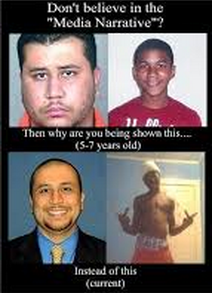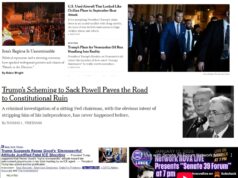( – promoted by lowkell)
 What disturbed me most about that whole sad affair was the reaction on the right in the wake of the trial.
What disturbed me most about that whole sad affair was the reaction on the right in the wake of the trial.
No empathy whatever for the distress that black people feel about a young black man getting shot and killed because of a train of events triggered by his doing nothing more than walking through a white neighborhood and then being followed by a “Neighborhood Watch” man who thought he didn’t belong there.
At my otherwise mostly extremely good high school reunion (I just returned from my 50th!), one classmate channeled the right-wing line that President Obama’s talk about “Trayvon could have been me” speech did more damage to race relations in America than anything in recent memory.
Amazing. Besides the complete lack of empathy, and probably connected with it, we see here an insistence on denial of the realities of what the historical experience has been, and the wounds that this experience has left.
Here’s how I see the meaning of the Trayvon killing for black people in America, growing out of many generations of experience.
The present event can be described in these terms: a black man is accosted, and shot to death by a man acting (as he saw it) as an agent of the dominant white world (one valid way of characterizing Zimmerman’s neighborhood watch role).
This represents a pattern associated,from the experience of many generations of black Americans, with deep trauma.
In the time of slavery, slave patrols –into which white Southerners were essentially drafted– to comb the countryside looking for blacks outside the slave quarters. If they did not have papers, they were subject to not only being returned to their owners, but also to being whipped or worse. Also there were slave-catchers, who might kill blacks thus caught.
In the time of Jim Crow, a black man might be lynched for stepping out of the role in which the dominant white culture sought to confine him. A regime of terror punished any black who failed to “know his place.”
That kind of traumatic history leaves its mark. And so, from the vantage point of a people who have absorbed those wounds, the events of recent times –a killing, the lack of any inclination (until pressure was brought to bear) to prosecute, and an eventual acquittal– fit a painful, frightening pattern.
How can any white person who knows that history not understand how painful and distressing such a recapitulation would be for a people whose collective memory is shaped by such experiences?
Today’s right wing had no trouble finding a way. The power of denial is so strong, that they’ve managed to see themselves as the victims entitled to feel outraged.
This gives us yet another glimpse into the psychology cultivated by that “sick and broken spirit.”


![[UPDATED 1/29/26] Audio: Sen. Tim Kaine Talks to Blue Virginia About His “Five-Point Plan” to Fight Trump’s Orban-Like Assault on US Democracy; Civil Disobedience a la MLK Jr.; Trump’s Bogus “Energy Emergency”; the Crucial Importance of the 2025 VA Elections; etc.](https://bluevirginia.us/wp-content/uploads/2025/02/kaineinterview2-238x178.jpg)









